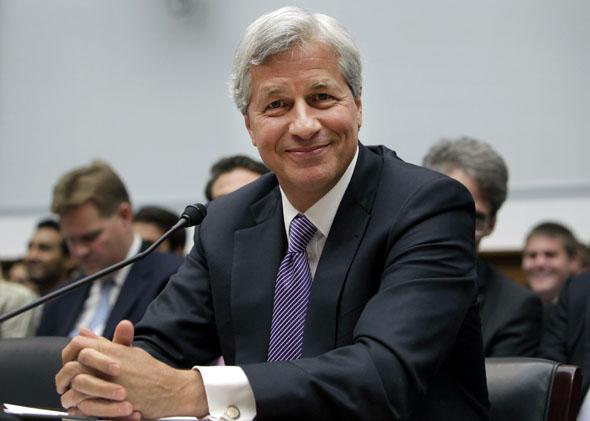The federal government might be out of appropriations and dangerously near defaulting on the national debt, but there is one source of funding that’s been extremely lucrative this year: fines on JPMorgan Chase, one of the largest banks in the world. The vast array of legal penalties levied on the bank is especially noteworthy because Chase and its CEO, Jamie Dimon, emerged from the financial crisis with one of the best reputations in the industry. They got out of the mortgage-backed securities business early, shored up their balance sheet, and were therefore able to take advantage of fire-sale prices on wounded banks like Bear Stearns and Washington Mutual. As recently as May, Businessweek hailed Dimon on its cover as Wall Street’s Indispensible Man—a giant among the titans of Wall Street.
Today, several months and billions of fines later, he’s … still a giant among the titans of Wall Street. And that’s the problem.
Tim Fernholz at Quartz recently compiled a comprehensive list of Chase’s legal woes. That includes a total of $3.68 billion in cases already settled for foreclosure irregularities, illegal manipulation of electricity markets, ripping off credit card customers, and compliance failures at four different regulatory agencies relating to the billions in losses on the London Whale trade. But those fines are small compared to the $11 billion settlement the bank could be facing related to mortgage abuses during the crisis years. And then there’s a Libor manipulation investigation, violations of the Foreign Corrupt Practices Act, manipulation of a corporate bond index, an obstruction of justice investigation, and even potentially some involvement with the Madoff ponzi scheme.
Yet today, Dimon’s position is if anything more secure than ever. When Salon’s Alex Pareene went on CNBC to suggest that perhaps overseeing the largest fine in regulatory history should get Dimon fired, he was cheered by many in the media but roundly dismissed by the rest of the panel. After all, JPMorgan is making a lot of money. The hosts seemed quite genuinely scandalized by the notion that a person’s conduct should be measured by anything other than the share price of his company. And the fact of the matter is that Dimon’s done well by that measure.
Last spring, a coalition of pension funds that own major stakes in JPMorgan launched a proxy battle seeking to end Dimon’s somewhat unusual dual role as CEO and chairman. A board can’t very effectively supervise a management team when the head of the management team is leading the board. Dimon boldly countered by vowing to quit both jobs if he lost either. It was a high stakes move, demonstrating exactly the sort of ballsiness for which Wall Street hotshots are well-known and which occasionally crashes the global economy, and it worked. The fight looked tough for a while, but when the votes were finally counted, he won in a landslide. Nobody is talking about him leaving anymore.
Which is where Pareene’s argument for firing him breaks down. “If you managed a restaurant and it got the biggest health department fine in the history of restaurants,” he argued, “no one would say ‘Yeah, but the restaurant’s making a lot of money. There’s only a little bit of poison in the food.’ ”
No one would say that not because the restaurant industry is more honorable than banking, but because you actually can’t run a profitable restaurant while getting constantly slammed with regulatory actions. When restaurants flunk health inspections, they get shut down and can’t reopen until they address the problem. The scenario of the restaurant owner who’s hit with unprecedented regulatory actions but is making lots of money anyway just can’t arise. The purpose of the system is to threaten restaurateurs with monetary penalties so severe as to threaten the collapse of their business.
The bank regulation system is quite different. Of the giant $11 billion fine, $4 billion comes in the form of an agreement to provide “mortgage relief” to customers—something that banks in prior cases have gamed in various ways to avoid large financial losses. Meanwhile, it turns out that the Justice Department is teaming up with JPMorgan to argue that about $3.5 billion of the settlement money should actually come from the FDIC rather than the bank. The theory is that much of the liability is something Chase inherited from Washington Mutual when it bought the failed WaMu from the FDIC, so the FDIC should share the liabilities.
Which is to say that the government is very much not trying to fine JPMorgan Chase into oblivion. Quite the reverse. When an otherwise well-located restaurant closes due to regulatory violations, it creates a business opportunity for someone else to take over the space. If a major bank were to find itself at risk of bankruptcy due to regulatory violations, the country as a whole would face the risk of a financial panic. Restaurant closures, by contrast, are sad for employees but pose no systematic threat to the economy. It’s this privileged position in the economic landscape that makes bank regulation so unusual and so unsatisfying. Small penalties can be shrugged off, while large penalties put the entire system at risk.
JPMorgan’s legal woes and its CEO’s secure job, in other words, are fundamentally a reminder of how much work is left to be done in reforming American finance. We need smaller, less-leveraged banks and a system less prone to runs and panics. Only then will regulators be willing to wield the really big sticks, and only then will executives worry that malfeasance could crush their business.
